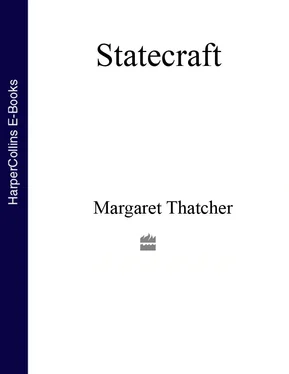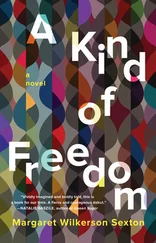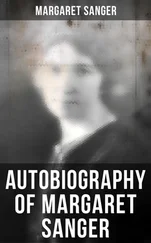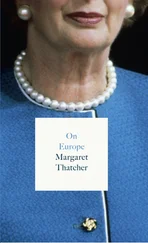The past results of Russian policy are easy to see, and they have been wholly destructive. Georgia, Azerbaijan and Armenia remain in a state of disorder, corruption and political decay. And the vast wealth of the Caspian is still not being properly used. The West has to try to ensure that law-based, stable states are developed in the region; that customers for oil and gas are not deprived of a vital alternative source to those of the Middle East; and that there is a sensible accommodation with Russian interests. For its part, Russia will need to accept that although both Central Asia and the Caucasus fall within its traditional sphere of interest, that sphere cannot be exclusive if these regions are to prosper. And it is in Russia’s own interest that they should.
Coping with tensions in the Northern Caucasus is a still more difficult matter, for of course the region actually lies within the frontiers of the Russian Federation. The non-Russian peoples there have endured a miserable history, and they can hardly be expected to thank Russia for it. That is especially true of Chechnya.
In Stalin’s deportation of 1944 some two hundred thousand Chechens lost their lives. When the USSR collapsed and the ‘sovereign’ republics of the Southern Caucasus escaped, the Chechens like the other non-Russian peoples who found themselves in the new Russian Federation were denied their freedom. They rebelled and declared independence.
In 1994 the Russians moved to repress the revolt. The Kremlin and the Russian armed forces were determined to demonstrate to other ethnic groups tempted to break away that their action would not be tolerated. The Russian campaign was also motivated by the desire to keep control of the vital oil pipeline which ran through Chechnya. As is well-known, this first campaign led to disaster from which only the charisma and negotiating skills of General Alexandr Lebed extracted the humiliated Russian forces.
Russia’s second campaign against Chechnya in 1999 had similar motives. But it was far better prepared, the number of Russian troops involved was much larger, and – measured against the objective of crushing Chechnya – it was quickly successful. It was clearly intended as a showcase for Russia’s military might. Even the well-documented brutality against civilians was intended to teach Russia’s enemies a lesson. The message was that in spite of the West’s edging Russia aside in Eastern Europe, in the Middle East and in the Balkans, Moscow was in charge of its own backyard.
The second Chechen campaign was waged with the enthusiastic support of the Russian people – and this is highly significant. *Of course, it is possible to argue that Russians were given a one-sided view of the conflict by their media. And it is certainly true that the Chechens played into Russian hands when its Islamic fanatics broke into neighbouring Russian Dagestan. But what aroused Russian nationalism was desire for revenge after a series of bombs in the late summer of 1999 left over three hundred Muscovites dead.
To this day no convincing evidence of Chechen involvement has been produced. But the Chechen campaign turned an almost unknown Prime Minister Putin into an overwhelmingly popular President Putin in the space of eight months. It also left a city desolate, thousands of civilians dead and a tide of pitiful homeless, hopeless refugees.
Russia’s treatment of Chechnya has been inexcusable. But it is not inexplicable, especially given the fact that – whoever planted the bombs in 1999 – the Chechens have, over the last three years, become increasingly involved in terrorism. Ominous developments have been hijackings, suicide bombings, attacks on civilian installations and growing ties with Islamic terrorists, including Osama bin Laden. None of this, though, provides a justification for Russia’s refusal to respect the wishes and interests of the Chechen population. Most Chechens are far from being Islamic fanatics: it is national, not religious, grievances that matter most to them. Before 11 September the Russian people had started again to be weary of the brutal campaigns aimed at crushing Chechen resistance. Prosecution of the wider war against terrorism must not now become an excuse for the Russian authorities to renew their attempts to wipe out the Chechen nation. Otherwise Moscow will become the terrorists’ main recruiting sergeant in the Caucasus.
We have to speak the truth clearly about Russia’s behaviour: in Chechnya it has been unacceptable
We must make it clear that, while respecting the interests of a great power, we reject any right for Moscow to destabilise other countries of the former Soviet Union
The Baltic states should be brought into NATO, as they desire, at the right time
The West has important interests at stake in Ukraine (which borders NATO) and in the Central Asian and South Caucasian republics (which contain huge reserves of oil and gas which both we and Russia need to have developed); all these states should receive our attention and support – political, technical and economic
We must continue to cooperate with Russia in resisting Islamist extremism in Central Asia.
DOING BUSINESS WITH MR PUTIN?
President Putin’s personality and background have been the subject of a large amount of speculation and debate ever since it appeared certain that he would be master of the Kremlin. We know the basic facts; the difficulty is to be sure of what to make of them. Vladimir Putin fulfilled his childhood dream of joining the KGB, the Soviet secret police, in 1975 at the age of twenty-two. He spent the late 1980s working alongside the East German secret police, the Stasi, among other things spying on NATO (as he disclosed in a book-length interview in March 2000). In the early 1990s he returned to his native St Petersburg, first to work at the university and then joining the administration of the late Anatoly Sobchak, the reformist but allegedly corrupt mayor of St Petersburg. In 1996 Mr Putin was brought to Moscow to be Deputy Chief Administrator in the Kremlin. In 1998 he was appointed head of the Federal Security Bureau (FSB), the KGB’s successor. He then moved from Secretary of the President’s Security Council to become Prime Minister in August 1999, succeeding Mr Yeltsin the following March.
All of which tells us practically nothing; indeed, given Mr Putin’s background in a profession where deceit and disinformation are all it may be less than nothing. It is always important in matters of high politics to know what you do not know. Those who think they know, but are mistaken, and act upon their mistakes, are the most dangerous people to have in charge.
Britain’s current Prime Minister certainly felt no inhibitions about pronouncing judgement on Mr Putin. He enthusiastically described the then Acting President as a ‘moderniser’ and offered to allow him to benefit from the expertise of the Downing Street Policy Unit. Mr Blair stated as well that Mr Putin ‘believes in a Russia which is ordered and strong but also democratic and liberal’.
A good deal of this was wishful thinking. Western leaders looked forward to dealing with a Russian leader who was healthy, sober, predictable and presentable. And they therefore hoped against hope that they were also dealing with a reforming democrat. It was, indeed, possible that such a person might have emerged from the stable of the KGB. But it was equally possible, and perhaps more probable, that Vladimir Putin was closer to the model of that other ex-KGB chief who became President, Yuri Andropov – hailed by the West at the time as a pro-Western liberal because he liked jazz and drank Scotch, ignoring the fact that he had also been a central figure in the brutal suppression of Hungarian freedom in 1956. Shortly before his election, Mr Putin solemnly unveiled a plaque to Andropov in the KGB’s old Lubyanka headquarters. That was not, all things considered, a reassuring sign.
Читать дальше












